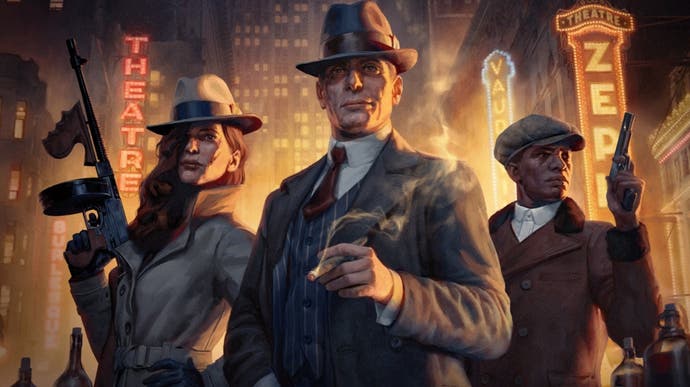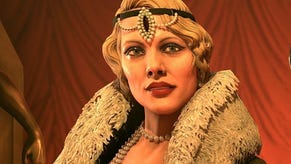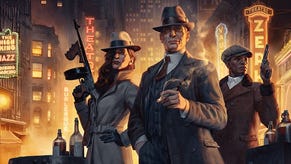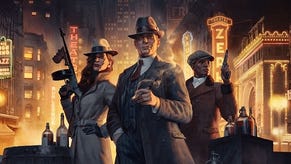Empire of Sin review - intoxicating but overwhelming
The roaring d20s.
There's a lot to like about this 1920s gangster sim. It's an intricately detailed game about a romanticised time. And as you would expect, it has gangsters in fedoras and fur coats and flapper gear, and Tommy guns and knuckle dusters and baseball bats. Those curvy old cars and delivery trucks rumble down the cobbled, often rain-slicked streets. And behind the mundane facades of everyday life - the grocery stores and laundry houses - the illicit industries roar. Speakeasies jump with music and laughter while breweries bubble in an effort to keep up. And you can see it all in gorgeous detail, right down to the fug from the cigar smoke and the glow from the lanterns.
Perhaps more importantly, you can get right up close to the people you control, which breathes personality into the game. You can get to know the gangsters you employ, like Big Fat Gibby Willard (that's his name!), who runs around in trousers and braces but no top, exposing his flabby upper half. He was great until a police officer strayed into a rumble we were having and he died. And now - yes - he's dead for good.
But there are loads of other gangsters I can hire, not that I can afford them all. And they all have their own stories, own ridiculous names, own traits, own capabilities. Some love each other, some hate each other. Some are better drunk than sober. Some are courageous and others timid. They all have their pros and cons. Some can even work against you as a mole, though you'll never know for sure. And you'll come to know those you hire like family.

You'll get to know other bosses too. You'll have sitdowns with Al Capone and Angelo Genna, real names from the time, as well as a few who've been made up, and others sequestered from elsewhere in history. Take Elvira Duarte, who I played: she's an older lady who ran a crime empire in Mexico at roughly the same time, and she also happens to be a relation of John Romero's - husband of game director Brenda Romero. Elvira has a wonderful ability whereby she can blow hallucinogenic dust into an enemies face and effectively mind control them, but other bosses have similarly exaggerated abilities too. It's a game-setting that pops with this kind of romanticism, albeit clearly underpinned by a lot of homework.
The other big thing about Empire of Sin is that it's simultaneously a kind of city-management game. In addition to running a crew around the streets of Chicago, and getting into XCOM-style, turn-based battles, you also take over buildings and turn them into illegal rackets. The kind of rackets you can own are speakeasies, brothels, breweries, casinos, and hotels. You can either buy them or take them from someone else, and when you've got them, you can upgrade numerous aspects of them.
To facilitate this, you can zoom out from street level to a simplified building-level view and, at a glance, see who owns what, and what each building is. You can pull back even further to see a summary of each neighbourhood in Chicago, how they're doing and who owns them. And pages of statistics, ledgers and graphs, underscore this, helping you tot up where you're strong and where you could be better.
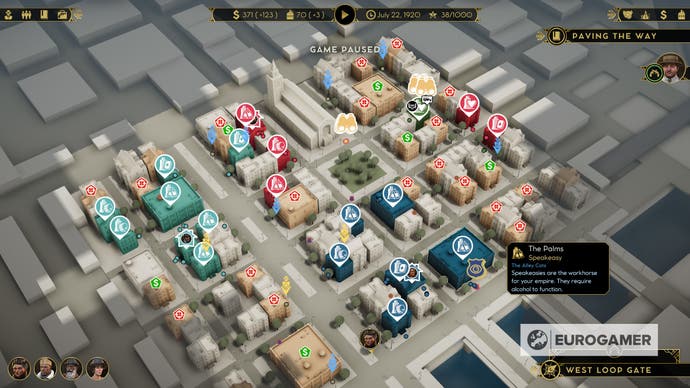
Do you have too many gangsters on your payroll? Are you serving the right kind of alcohol for the prosperity level in your neighbourhood? Can you breweries produce it or do you need to buy it in from another gang? How are your brothels and speakeasies doing - are they full? Maybe it's worth investing in word of mouth advertising? Or you could open a hotel nearby and earn a bonus from it, as customers there are funneled to your rackets. But be careful you don't draw too much suspicion or authorities will come knocking, and other gangs will too.
For a while, you'll expand undisturbed. You'll studiously follow the few missions in your journal, do your companion quests and get to know the people around you. You'll take over a few thug-occupied rackets in the neighborhood and you'll carefully tweak your meagre empire to milk every cent out of it. Progress will feel calm and manageable.
But as you grow, more things will vye for your time, and it's here the game starts to stretch out of shape. The more buildings you take over, and there are many of them, the less attention you will be able to give each one, unless you cherish an exhaustive amount of admin. There are summary screens to try and aid this, but you're still asked to click individually on each one to select an upgrade, or to open and close them to lower suspicion levels. And it takes time. A lot of time.
Then, your allies start talking about war, which can be great, because when you're in a war, you can attack your enemy's buildings without other factions telling you off. The drawback is, your buildings will be attacked in return, and when they are, you will be whisked across town to control their defence (when you'll discover first hand how effective your security upgrades have been). These battles are usually very boring. Often, they're very one-sided, a few against many, but you still have to play out the foregone conclusion one agonising turn at a time.
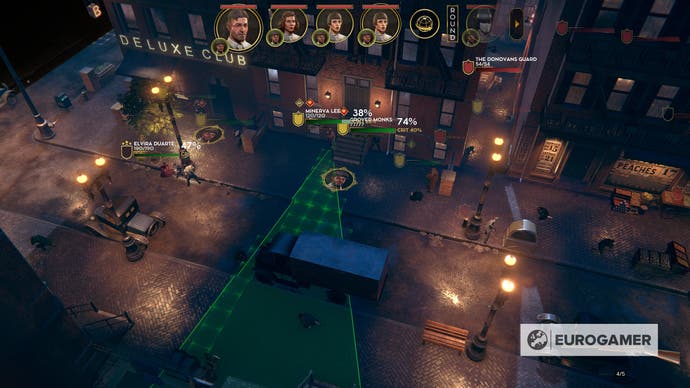
Combat is decent but can lack excitement and be fiddly. Sometimes you accidentally end up putting characters where they shouldn't be, or order them to do something you didn't mean to, and in a high-stakes battle it can cost you dearly. Encounters can feel a little drawn out too, partly because of fairly weak weaponry early on. But once you better equip your team, and unlock more abilities, things get more interesting. It's a shame the same can't be said for the bog-standard guard battles. Not being able to auto-complete them, and to stop them interrupting whatever you're doing, is an oversight.
It's made doubly frustrating by virtue of there being so much to do. The layers that make the game unique begin to almost cannibalise each other the further into the game you get. Suddenly a companion wants to talk to me but I can't because another gang wants a sitdown, and then me to join their war, and then someone is attacking my bar. And all the while I haven't been able to optimise my empire in ages. I'm not even sure what I own.
But apparently, according to the graphs, I am the biggest gang, which is odd, because I don't feel like I've seen a fraction of the other neighbourhoods out there. So I put my apparent standings to the test and assault a rival's safehouse, which is a hard thing to do. And it's a really tense, exciting battle, and somehow, I win.
Then I figure, well if I can do that, I can probably take on the other safehouses too, so one by one, I set about it. And each time I win, I add their entire empire to my own. I'm not even bothering with optimisation any more, because more and more money is rolling in regardless, and the weapons I've taken from the bosses are incredibly powerful.

I'm unstoppable. Other gangs are asking for sitdowns but they can get lost - they're next. And I don't need to do any more quests because the real end - domination of Chicago - is in sight. All else falls to the wayside until the final battle is won and Elvira Duarte crowned queen of Chicago.
I feel as though I've just done the equivalent of tank-rush. I've barely seen anything of the other neighbourhoods but somehow I've won. And all the negotiating, the trading, synergies - the nuances of a strategy game: I haven't done any of that in ages. I never saw anything of the police, never saw the Bureau of Investigation. Surely I should have. But I suppose this is what happens when you cede control to a randomiser, and tell players to do it their way. It's also what happens when you start every faction off at the same time.
It would have been great for other factions to have a head start so that I had an empire to chip away at while I tried to find a foothold in the city. It would have given the campaign a shape and a climax, it would have given a value to eeking out optimisation of my empire, and it would have given me an epic final battle to cap things off. As it was, Al Capone was seen off by someone in a few days, and no one really got a chance to establish themselves into anything special.
The flip-side of that is it could be very different next time. And that's exciting. The next time I play, Al Capone might be more the figure of history I know him as, and all the other gangs might start further afield, giving them more time to build. Big Fat Gibby Willard might not be gunned down in the park. I might have a whole different team of gangsters. I'll be a different boss. I'll try a harder difficulty. And I'll leave myself at the mercy of the variables and hope they land in a slightly more interesting way. Because that's all it needs, one perfect throw of the dice, and it could be magic.
